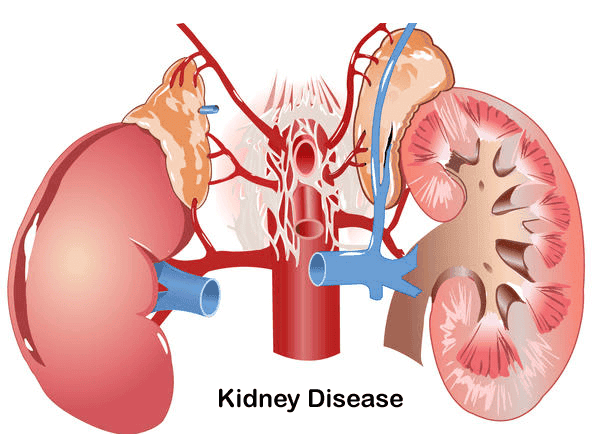Like any other type of surgery, kidney transplants are also not risk-free. Although, the rates of serious complications have fallen in the last few decades. The risks of a kidney transplant include the following:
- Risks of procedure/ surgery
- Risks related to immunosuppressant medicines
Most after-effects are in the first few months of the transplant, but they can be after many years too.

Short-term complications
Infection
A few minor infections, such as UTIs, colds, and flu, are observed after kidney transplants. One can also see serious infections like pneumonia etc., requiring hospital treatment.
Blood clots
Blood clots can also develop in the arteries connected to the donated kidney. Thus, removing the donated kidneys is necessary if the blood supply is blocked. It is also seen that it raises the risk of developing deep vein thrombosis (DVT).
Narrowing of an artery
Arterial stenosis means the narrowing of the arteries. It is also seen after a kidney transplant in the arteries connected to the donated kidney. Arterial stenosis can also cause a rise in blood pressure.
Blocked ureter
The ureter can also be blocked after a kidney transplant. It can be seen soon after the transplant or can get blocked months or years later.
Urine leakage
It usually happens during the first month after the surgery. If you develop a protine in urine leakage, you may need another surgery to repair it.
Acute rejection
It means that your immune system begins to attack the donated kidney. It occurs as it recognises the transplant as foreign tissue. Often, acute rejection does not produce noticeable symptoms. It can be detected by certain blood tests only.

Long-term complications
Immunosuppressant side effects
Immunosuppressants are medicines that suppress the body’s immune system. It restricts the immune system from attacking the new kidney. A combination of 2 or 3 immunosuppressants can also be prescribed for kidney transplant patients. It would be suggested with long-term usage.
One can observe a wide range of side effects, including:
- abdominal pain
- acne
- diarrhoea
- diabetes mellitus
- extra hair growth or sudden hair loss
- high blood pressure
- increased risk of infections
- increased risk of diabetes
- mood swings
- swollen gums
- thinning of bones
- weight gain
- risk for certain cancers, particularly skin cancer
Diabetes
Diabetes is a common complication post-kidney transplant. It is a condition that raises a person’s blood sugar levels. Some people develop it post kidney transplant. Since people no longer feel unwell, eat more and thus gain too much weight. Some types of immunosuppressants can also raise the risk of developing diabetes. Diabetes can be controlled by combining lifestyle changes; diet alterations and medicines.

High blood pressure
High blood pressure is another common long-term complication seen in a kidney transplant. Many people post kidney transplant develop an increased risk of high blood pressure. Also, the intake of immunosuppressants can make the condition worse.
High blood pressure can increase the risk of developing other serious conditions like heart disease, strokes, etc.

Cancer
The long-term use of immunosuppressants increases your risk of developing some cancers. These include:
- skin cancers like melanoma and non-melanoma
- Kaposi’s sarcoma – cancer affecting the skin and internal organs
- lymphoma – lymphatic system cancer
You can reduce the risk of skin cancer by avoiding exposure to the sun. You can also apply sunscreen cream to your lips and other exposed areas of your skin daily.
Alternative with Ayurveda
We can see the uncountable after effects of kidney transplants. It is advised to look for a safe and secure alternative treatment for kidney diseases.
Ayurveda expounds on life’s wisdom. It states that an imbalance or tension in your consciousness brings on your illness. Ayurveda suggests lifestyle changes and herbal treatments. It means that humans are a part of the environment they are living in. The body, mind, spirit, and surroundings should harmonise.
Ayurvedic kidney treatment first works on the internal purification process. It is followed with a special diet and a few herbal remedies. In cases when required, some specific massage therapy, yoga, and meditations may also be suggested.

The ayurvedic treatments for kidney transplant work with the elimination of impurities. It then moves towards removal of symptoms, and increasing body resistance. It also reduces tension and increases harmony in life. Herbs and other medicinal plants are used for these processes. Ayurveda first understands the root cause of the disease. It has been generally observed that patients with kidney diseases have disturbed Agni. The disturbance in Agni does not allow the food to get properly digested. The undigested food produces “ama.” Our current lifestyle drifts us away from nature. We are consuming incompatible foods, drinking alcohol, chewing tobacco, and engrossing stress. All these contribute to disturbed Agni.
Thus, on comparing the side effects of kidney transplant with the health benefits of ayurvedic kidney treatment it is always suggested to go for ayurvedic kidney medicines. Approaching early will help in achieving health early.

